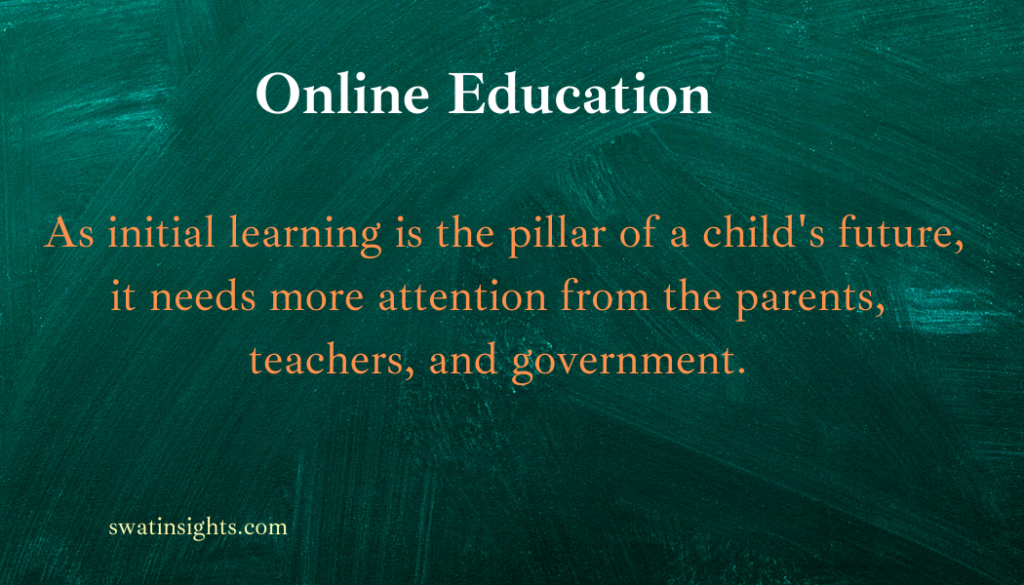Earlier classrooms are surrounded only by four walls. But now, after the introduction of online education, classes have moved into our homes, parks, and onto our smartphones. Even during traveling, we don’t miss our class. Isn’t it great? Let’s Discover how Online Education works, its challenges, and ways to improve it.
The most affected sector during a pandemic is the education sector. All the schools, colleges, universities shut down worldwide.
It is the student who suffers maximum, especially in the rural areas. Even students lose access to coaching classes and private tuition because of lockdown.
Due to the sudden outbreak of COVID-19, all educational institutions compels to shift their offline classes into online classes.
But not everyone was ready for this immediate change, neither teacher nor students. Not everyone is familiar with the new method of schooling. It is a substitute for the traditional way of learning.
Problems and Challenges of Online Education:
- Technical Issues:
- Communication Issues:
- Distractions:
- Gadgets:
- Digital Divide:
- School Dropout:
- Health Issues:
- Lack of Discipline and Time management:
- Adaptation of new normal:
- Electricity Problem:
- Security Issues:
- Issues Related to Initial Stage of Education:
- BENEFITS OF ONLINE EDUCATION:
- WAYS TO IMPROVE ONLINE EDUCATION:
- CONCLUSION:
Technical Issues:
To teach or to learn, the basic knowledge of computers is necessary. But not everyone is comfortable working digitally.
Offline education doesn’t need any digital skills. But in online education, all content or study material is prepared on the desktops.
Because of poor connectivity, images and videos get blurred. Slow internet does not match the pace of the class, then students lag. Therefore technical skill is need of the hour.
Communication Issues:
In offline education, the teacher can read the expression of the student. But this new mode of education lacks this communication among the teacher and the student.
Another drawback of online education is that it only became theoretical. It lacks the laboratory experiment in person.
Distractions:
Online education gives a boost to the use of social media. They have easy access to other websites. Here, the guidance of the parents is required.
During the lockdown, everyone started to stay at home all the time. Work from home culture developed abruptly. As a result, students are not getting separate rooms or a peaceful environment for their online classes. Sometimes, only it becomes a one-way learning platform.
Gadgets:
Gadgets like a smartphone, tablet, desktop, laptop are prerequisites for online education. Still today, the Indians who own a smartphone is low.
There is also a problem of sharing the same smartphone amongst siblings. It hampers the classes regularly.
Digital Divide:
In India, not everyone has internet connectivity. Inequalities in internet connection create the concern of Digital Divide.
Digital Divide refers to
Lack of data connection,
Limited data,
Speed of data is slow as the internet crowd increased rapidly during the pandemic,
Not everyone has devices to operate the internet.
School Dropout:
As not everyone has access to an internet connection, the school dropout rate also increases. Girls engaged in household chores during the lockdown experience more loss in their studies.
Many parents are facing economic obstacles. They have to choose either livelihood or education. Under the circumstances, students are leaving schools.
Health Issues:
Both teachers and students spend most of their time sitting in front of the screen. It enhances our mental ability, but physical health is somehow worsening.
Obesity, weakening of eyesight, stress, insomnia, fatigue, headaches, body pain are some of the side effects of online classes.
Lack of Discipline and Time management:
As online classes began to shift according to our time, the discipline of students deteriorated.
Earlier, schools and universities were the priority of students. Classes came first, and then all the work followed. However, now almost all thework needs to be done before the class.
The time limit to deliver a lecture is already mentioned. It restricts the ability of the teacher to teach a lesson effectively. Sometimes, it seems like online classes only became the formality of the students as well as teachers.
Adaptation of new normal:
To adopt new things need time. Students have been familiar with physical education for many years. Instance shift from copy-pen to keys of the desktop, blackboard to screen is not an easy task. This time gap is mending on the cost of students’ future.
Electricity Problem:
Gadgets (desktop, smartphones) need electricity to work. There are also 24*7 television channels dedicated to online study.
Even today, not every person indeed has access to electricity. If they do have electricity connections, then they are dealing with frequent power-cut problems.
It obstructs the route of online education’s future in India.
Security Issues:
As the world goes digital, Almost everyone remains online for their work. People started to share their personal information with every second website.
Almost all the study materials, test papers, assignments, and personal information are kept safe in the cloud. It increases the threat of cybercriminals and hackers. It makes them easier to encroach on our private space.
Issues Related to Initial Stage of Education:

This alternative way of learning harms the students of elementary school mostly. Children don’t want to sit for too long in front of smartphones or desktops. And if they do learn online, then the problem of health issues occurs. For instance, it affects their eyesight.
Besides, Students lack social connectivity that hampers their socio-psychological growth. Children are becoming more introverted because of this, which sometimes leads to extreme behavior.
Not every parent knows how to handle devices. Consequently, children under the age of five are losing their first step towards the future.
BENEFITS OF ONLINE EDUCATION:
- It is next-generation learning. It strengthens the learning experience.
- The first and foremost benefit of online education is, it is flexible one can learn from anywhere and anytime according to convenience.
- Through online education, distance learning is applicable for working professionals.
- It is different from traditional classroom teaching. It is available in the form of projects, presentations, demonstrations, etc.
- Online education makes students comfortable with devices(tech-friendly).
- It saves time for traveling.
- There is no geographical barrier in online learning.
- Its classes are even available in recorded format. Students have access to those courses at any time. Therefore, they can resolve their doubts effectively.
- Most students hesitate to ask the doubt in the classroom. But in online classes, they feel free to ask.
- In the online education system, the responsibility of teachers increases. In digital learning, quality is essential. Without appropriate content or study material, the quality of education deteriorates. As a result, the quality and effectiveness of courses also increase.
WAYS TO IMPROVE ONLINE EDUCATION:
Education continuously changing its dimensions,
Students are more dedicated to learning new concepts and skills than seeking only degrees and diplomas. To adopt the new way of learning, Digital literacy and Technical skill is need of the hour.
Do not hesitate to ask for help either from teachers or parents.
Live chat facility, via email or phone call, adds an extra star to their performance.
Feedback and suggestions help in improving the quality of online learning.
The parents must provide a peaceful environment to avoid distractions during online classes.
Make a timetable and stick to them no matter what happens. It saves time and helps to retain the discipline of the students even at home.
Take regular breaks in a period to avoid facing the screen for long.
The quality of the lectures acts as the backbone of the online class. Teachers can upgrade it with regular quizzes.
To move from slow internet connections to fast connections. The government must provide broadband connections to rural areas.
Using solar lamps instead of solely depending on electricity can be a better option.
Data security laws need prioritization. Keeping our data safe is the need of the hour.
NGOs and Anganwadi centers will play a crucial role in educating students and parents, the importance of digital learning.
CONCLUSION:
According to the sociologist and thinker ALVIN TOFFLER’s book – FUTURE SHOCK(1971)
A person of the 21st century will not be those who cannot read and write, but those who cannot learn, unlearn and relearn.
The aforementioned is the demand of the current education system.
Technology and education must go simultaneously. It is not something that changes in a day. It is in the process of evolution.
The step of the government in this path is also applaudable. National Digital Library of India, Swayam Prabha, Skill India mission is some the initiative of our government.
Our patience and awareness can be a great help to make Online Education- the future of India.


Well written article. Truly appreciate the effort to provide a wonderful article for us to read.
Thank you so much for your appreciation.
Really helpful and well written article.
Thank you.